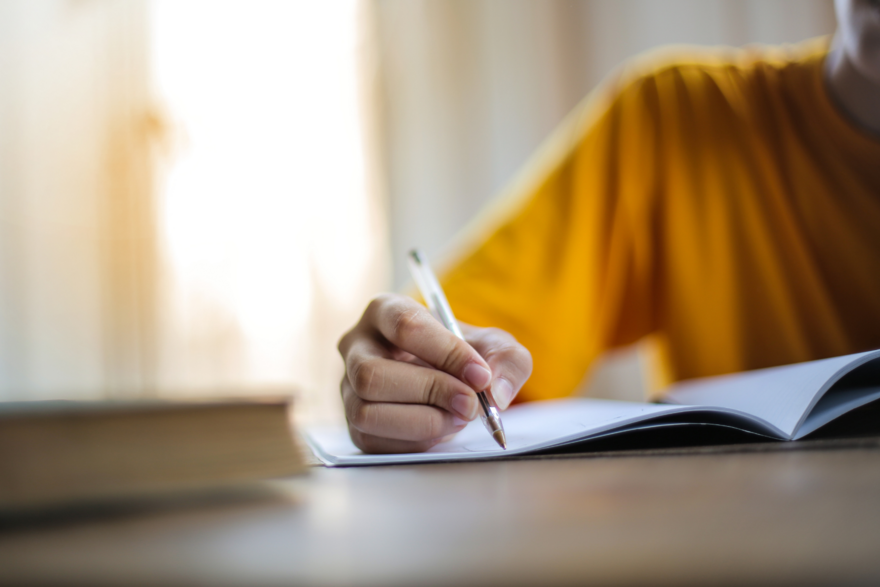Why you should write by hand.

Making time to write by hand can be tough. I know: it’s messy, and it takes longer. A whole page of handwriting only comes to about half a page of typing once you transcribe it. Handwriting can look sloppy and unclear. And an hour’s worth of scribbling on a page in blue ink doesn’t hold nearly the same crispness and efficacy of a double-spaced page of sentences set in Times New Roman.
And yet.
Here are my three reasons for writing by hand (check out some more benefits here). They’re all important, but honestly, the last one is the kicker.
1. It’s too easy to edit yourself brutally when you’re typing on a screen.
When you press delete on the computer, you erase your tender ideas before they even have a chance to take root. When the deleted sentence disappears from the page it disappears from your consciousness.
Writing by hand creates a map of your explorations. Even if you scratch out a sentence, the remains of that sentence are still there on the page; their presence affects the next sentence you write, and the sentences after that.
When you are writing a first draft, divining your story as you go, you need these markers to guide your subconscious. They are your material! Taking them away is cruel, and makes creative work harder than it has to be. When you’re writing a first draft, you don’t know if what you’re writing is any good or not – you simply don’t have access to that judgment at this stage. You’re exploring – and that means turning off critical analysis. Handwriting allows this to happen more readily.
2. To your brain, writing by hand feels more like making art.
Drawing the letter B is making a mark with your hand. As you write, your letters turn into words and sentences, but the act of putting ink to paper activates the right hemisphere of your brain. This is the part of the brain that sees in pictures.
Try this: on a blank piece of paper, write a list of words that start with the letter “B.” Write the words very slowly, as they come to you. Print them in all capital letters, or make your cursive ribbon-like, as though you were a calligraphist. Line them up one under the other to make a word tower. Continue to play with the shapes of your letters as you write the words. Experience the peaceful, exciting bloom of creativity as it floods your right hemisphere. You’re working with language, yes, but you’re also playing, you’re drawing.
Then turn the page over, and continue to write by hand, this time using characters and voice. You’re warmed-up, now. You’re limber, your brain feels elastic. Do that for 10 minutes every morning. It feels so much nicer than powering up your computer, feeling distracted by your inbox, and trying hard to crunch out a brilliant page of sentences on your first brittle go in the Microsoft Word Print Layout View. But here’s my main reason:
3. Handwriting is more real.
It feels more important, in the way that counts. More special. If you want to develop a healthy relationship with your writing, if you want your writing to know that you think it’s real, important and special, then you write by hand. It doesn’t matter that it takes more time, or that it’s inconvenient -- when you love something, you write it by hand.
Think about the last time you received a handwritten thank you card in the mail. Wasn’t it lovely? Wasn’t there more emotion and feeling in those few loopy sentences than in all of the emails you’ve received in your inbox for the past month, combined?
That person wrote that note at least a few days before you received it. She cleared some space on a table and selected paper and a pen, and then she thought about you. She thought about an experience she wanted to share with you, and then she put it into words. Magically, when you opened the envelope, you felt that focus. It’s a time capsule, a transmission. There’s energy in handwriting, and your body recognizes it.
We so rarely get to feel this anymore, because email has metastasized our correspondence. Even birthday cards are emailed now (although I disapprove of this). At least handwritten thank you cards are still de rigueur for wedding gifts and sympathy cards. And why? Because we want the emotion behind those events to stand out in our lives as real, important, and special!
Sentimental? Maybe. Inefficient? Almost definitely. But I’ll say it again: when you love something, you write it by hand.
xo,


24 comments
Leave a comment